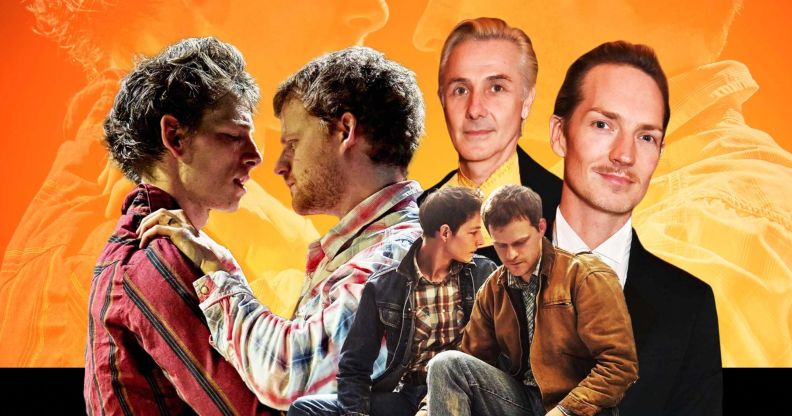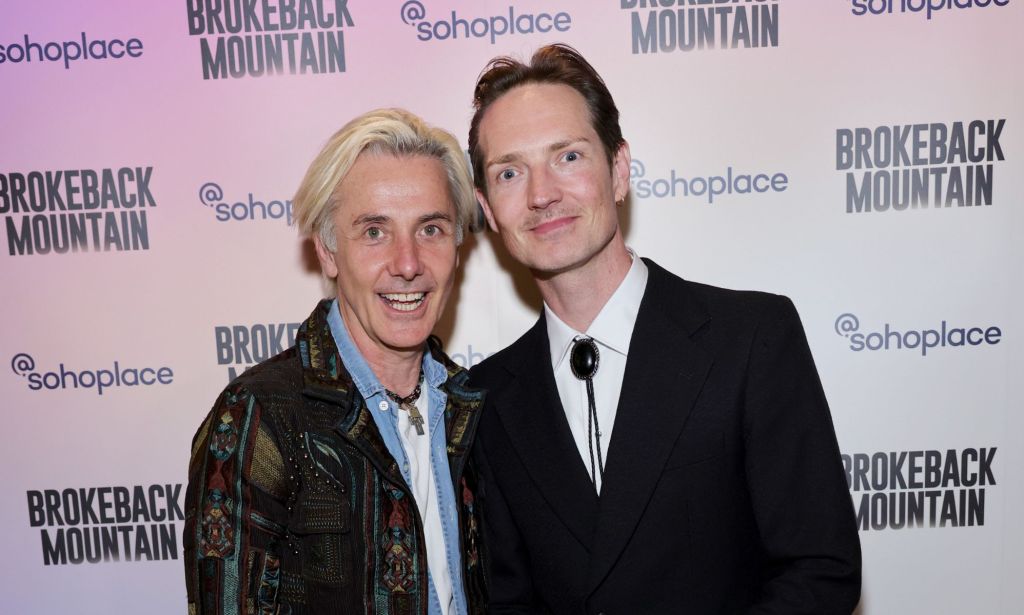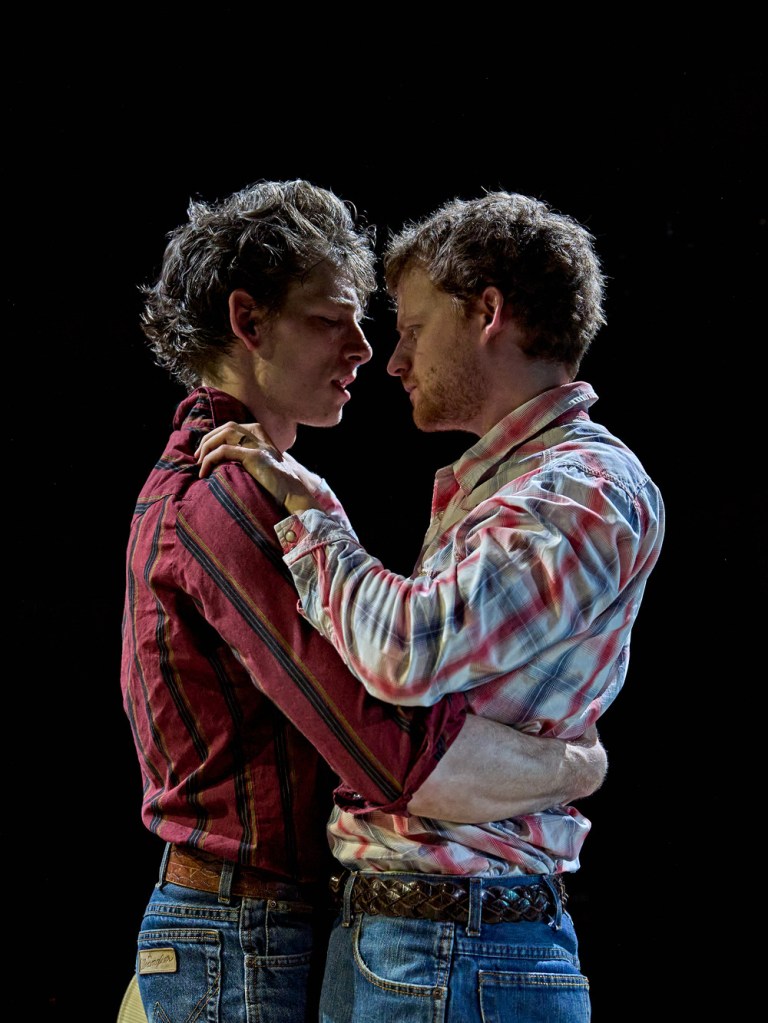Brokeback Mountain creators on why the queer love story matters now more than ever before

The Brokeback Mountain stage show has landed in London’s West End. (Getty/Manuel Harlan)
The Brokeback Mountain stage show has landed in London's West End. (Getty/Manuel Harlan)
With Brokeback Mountain pulling in theatre audiences in London’s West End, director Jonathan Butterell and music creator Dan Gillespie Sells tell PinkNews why they brought the seminal story to the theatre and why it matters now more than ever.
When Butterell first saw Ang Lee’s 2005, Oscar-winning film version of Brokeback, his reaction was “quite a visceral” one.
Music composer and The Feeling frontman Sells felt much the same. “You can talk about what it would be like to live in a world where being queer is just not acceptable to the point of life-threatening,” he says. “But then to see it, having [it] shown to you, is powerful in a way that being just told isn’t.”
Based on Annie Proulx’s 1997 novella of the same name, the story follows Ennis del Mar and Jack Twist as they venture from sheepherders to lovers in rural Wyoming in 1963. Their ceaseless longing for each other plays out over the following two decades, as society’s damnation of homosexuality keeps them apart.
The film, starring Heath Ledger as Ennis and Jake Gyllenhaal as Jack, split queer people into two camps: those who were old enough to have never seen a story told like it on the big screen, and those who were young enough to know that Brokeback Mountain was synonymous with being gay – before they even knew what being gay meant.
Now, almost two decades on from the film’s release, the stage version has arrived at Soho Place. Dear Evan Hansen’s Mike Faist is Jack, while Boy Erased’s Lucas Hedges plays Ennis.
The first question for anyone attempting to turn a classic film into a stage adaptation is, usually, why? Sells is clear that the play was inspired by Proulx’s original text, not the box-office hit.
“As soon as I read the novella, I saw lyrics. I saw the poetry of her prose coming at me. I was inspired to do something musically with it,” he says. “That’s all an excuse an artist needs.
“Anyone who has seen the film, but hasn’t read the original text, I recommend getting a copy because you’ll see what made us want to do this. It’s stunning.”
That answers another question. While the film is supported largely by light, country folk instrumentals, this production features live folk songs performed by three-time Brit Award winner Eddi Reader and her band. Again, that decision was led by Proulx’s work.
“We actually realised, quite early on, that there was no other way of doing it,” Sells says, praising the “descriptive, slightly abstracted, beautiful, very lyrical prose” of the original text. “If anything was going to bring us landscape and scale and seasons and time, it was going to be music.”
Butterell and Sells started work on the show six years ago – deciding how to stage a story that spans different US states and 20 years is not a simple task. Plus, there’s a huge queer legacy to contend with. Did they ever worry they’d fail?
“There is no guarantee that there is going to be this place that you arrive at, that is, for want of a better word, successful,” says Butterell, although he knows how to craft a successful stage show. In 2003, his Broadway revival of musical Nine, starring Jane Krakowski, received eight Tony nominations, winning two awards.

Perhaps even bigger, he directed the original Everybody’s Talking About Jamie, while Sells again provided the music.
“I think the more we work together, the more we realise that we’re the kind of people that finish each other’s sentences,” Sells says of their working relationship.
Jamie has become a critically acclaimed, global sensation.
Butterell adds: “The aspect of putting your work out, there is a risk, you know. You hope and you work for connection, that’s all you do. You work to try to connect it to other people. Once you’re committed to your work, you have no ultimate control about how it’s received.”
Brokeback Mountain has received, on the whole, a warm response. The Evening Standard called it a “potent, subtle piece of dramatic alchemy”, while Broadway World gave the “stunning, truly impressive” production a glowing five-star review.
City A.M., however, asked: “Where’s all the gay sex?”
It’s true that in the stage adaptation, the erotica dial is turned right down, which City A.M.’s reviewer called it a “bizarre decision,” but Butterell disagrees.

“I took it back to what Annie gave us in terms of what she described that intimacy to be,” he says, adding that there are certain acts of passion – such as condom-free anal sex in a tent – that, obviously, can’t be shown on stage.
“For me, what was fundamental was actually not the raw part of it that Annie describes when they become first intimate, when they first have sex. It’s actually their growing intimacy,” Butterell adds.
“I don’t think we could have shown a deeper level of intimacy on stage than we have done. If that includes a sense of nudity in some way, I never wanted this to be about that. That’s not what this piece is about.” With a bemused laugh, he rounds off: “It’s a tragedy, you know?”
Brokeback Mountain may be a fictional tragedy set 60 years ago, but it’s still imprinted on the collective queer consciousness today. While it highlights the extremities of discrimination, with Twist – spoiler alert – largely believed to have been killed in a homophobic attack at the end, it evokes a universal feeling of fear that LGBTQ+ people are used to.
“I grew up in a council house in Sheffield, but was experiencing the same kind of insular thinking,” Butterell says. He shares a story of being aged 21, walking down the street with his arm around a male friend, who had just revealed that he was also gay. Someone approached them, and “it turned violent… for me, it was dangerous to be out. It was literally dangerous.”

In 2023, it still feels dangerous. For the trans community in particular, that danger is becoming increasingly discernible. Across the world, too, LGBTQ+ people are facing a rising threat of persecution.
“I think of the story that Ennis tells about being taken as a nine year old to observe a man who is dragged by his genitals so badly that they’re pulled off,” Butterell says. “I read what’s happening in Uganda at this moment in time… [so] it’s as relevant as relevant can be.”
Earlier this year, Ugandan president Yoweri Museveni signed the Anti-Homosexuality Act into law. Those found “guilty” of having gay sex could face life imprisonment. Activists in the country have warned that anti-LGBTQ+ violence has already increased as a result.
“Even in the UK, and in America where [Brokeback Mountain is] set, this still happens. We have to be vigilant, we have to stand together, we have to fight together,” Butterell says.
Sells agrees that the world “is starting to feel oppressive again towards queer people”. Jack and Ennis’s story is a microcosm of the threat still facing the community.
“What theatre does, is shows you a thing. It makes you feel deeply about a thing,” he says. “In our piece, the thing is the cost of brutality. It gives us something to go: ‘This is what we’re fighting for. This is why the fight continues. This is why the war’s not won’.”
Brokeback Mountain is at London’s Soho Place until 12 August.

